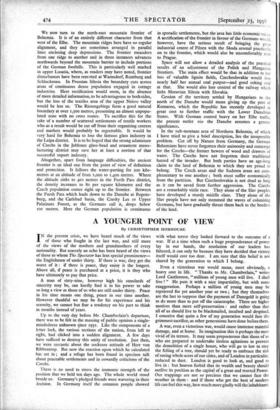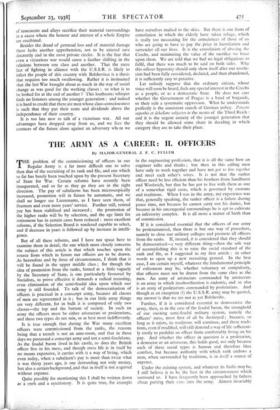A YOUNGER POINT OF VIEW
By CHRISTOPHER HOBHOUSE
IN the present crisis, we have heard much of the views of those who fought in the last war, and still more of the views of the mothers and grandmothers of every nationality. But scarcely an echo has been heard of the views of those to whom The Spectator has lent special prominence— the Englishmen of under thirty. If there is war, they get the worst of it : if there is peace, they enjoy it the longest. Above all, if peace is purchased at a price, it is they who have ultimately to pay that price.
A man of sixty-nine, however high his standards of sincerity may be, can hardly find it in his power to take so long a view as those of us who are still under thirty. Peace in his time means one thing, peace in our time another. However thankful we may be for his experience and his serenity, we cannot but fear a tendency on his part to think in months instead of years.
Up to the very day before Mr. Chamberlain's departure, there was to be felt in the massing of public opinion a single- mindedness unknown since 1931. Like the components of a letter lock, the various sections of the nation, from left to right, had clicked into a sudden alignment. A few days have sufficed to destroy this unity of resolution. Just then, we were sarcastic about the cocksure attitude of Herr von Ribbentrop. But now the reaction upon which he calculated has set in ; and a refuge has been found in specious talk about peaceable settlements and in cowardly criticisms of the Czechs.
There is no need to stress the immense strength of the position that we held ten days ago. The whole world stood beside us. Germany's pledged friends were wavering in their Jecision. In Germany itself the common people showed with what terror they looked forward to the outcome of a war. If at a time when such a huge preponderance of power lay in our hands, the resolution of our leaders has faltered, it can only be because they have decided that victory itself would cost too dear. I am sure that this belief is not shared by the generation to which I belong.
Even a victorious war would mean, most obviously, a heavy cost in life. " Thanks to Mr. Chamberlain," writes Lord Castlerosse, " millions of young men will live. I shall live ! " He puts it with a nice impartiality, but with some exaggeration. Perhaps a million of young men may be reprieved for yet another year or two ; but they themselves are the last to suppose that the payment of Danegeld is going to do more than to put off the catastrophe. There are higher motives than mere self-preservation : and rather than that all of us should live to be blackmailed, insulted and despised, I conceive that quite a few of my generation would face the grimmest sacrifice, as other generations have done before them.
A war, even a victorious war, would cause immense material damage, and at home. In imagination this is perhaps the most vivid of its terrors. It may seem preposterous that those of IF who are prepared to undertake tireless agitations to prevent the demolition of a single house, who will go to law to stop the felling of a tree, should yet be ready to embrace the risk of seeing whole acres of our cities, and of London in particular, reduced to dust. London is good to look at, and good to live in : but heaven forbid that its wealth and beauty should outlive its position as the capital of a great and trusted Power. Our trappings are not so precious that we cannot face the weather in them : and if those who get the best of modern life can feel this way, how much more gladly will the inhabitants of tenements and alleys sacrifice their material surroundings in a cause where the honour and interest of a whole Empire are combined.
Besides the dread of personal loss and of material damage there lurks another apprehension, not to be uttered save discreetly and in the most private circles. It is the fear that even a victorious war would cause a further shifting in the relations between one class and another. That the mere fact of fighting in alliance with the U.S.S.R. is likely to infect the people of this country with Bolshevism is a thesis that requires too much swallowing. Rather it is insinuated that the last War brought about as much in the way of social change as was good for the working classes : so what is to be looked for at the end of another ? This loathsome whisper finds no listeners among the younger generation : and indeed it is hard to credit that there are men whose class-consciousness is such that they put their rents and dividends above the independence of their country.
It is too late now to talk of a victorious war. All our advantages have dropped away from us, and we face the menaces of the future alone against an adversary whc m we have ourselves exalted to the skies. But there is one form of consolation in which the elderly have taken refuge, which is really too nauseating for the consciences of those of us who are going to have to pay the price in humiliation and surrender all our lives. It is the consolation of abusing the Czechs, and minimising the value of the sacrifice we force upon them. We are told that we had no legal obligations to fulfil, that there was much to be said on both sides. Why this odious hypocrisy should only show itself after our resolu- tion had been fully considered, declared, and then abandoned, it is sufficiently easy to perceive.
Let nobody suppose that the ordinary citizen, whose Voice will soon be heard, feels any special interest in the Czechs as a people, or as a democratic State. He does not care whether the Government of Prague is a band of brigands, or their rule a systematic oppression. What he understands perfectly is the consistent march of German policy. Parcere superbis et debellare subjectos is the motto of the Third Reich : and it is the urgent anxiety of the younger generation that they should be allowed some share in deciding in which category they are to take their place.







































 Previous page
Previous page